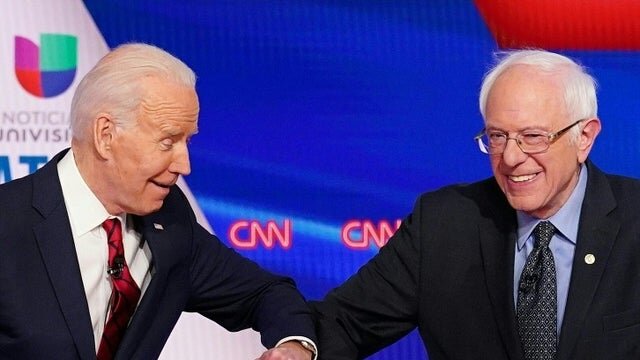Regardless of attempts by the Democratic Party' leaders to showcase a happy united family providing full supports for Joe Biden for the November 3rd presidential election, one can simply realize the widening gap among various layers of one of the two major contemporary political parties in the United States.
J.T. Young, who served different positions under President George W. Bush, has scrutinized current disagreements among the Democratic Party' members in his article published by the Hill.
"Joe Biden would like to welcome America to Democrats’ Potemkin Village of Unity. Heralded by countless press releases, endorsements and rallies it is described as a charming place. Unity’s only problem is: it does not exist. It is a facade overlaying a growing five-year fissure that will erupt after November — win or lose," Young explained in his article.
"In the 1800s, minister Grigory Potemkin purportedly perpetrated a hoax on Russia’s Empress Catherine II. Erecting model villages — then disassembling and reassembling them farther up her route — he conjured the impression of a prosperous countryside. He also created a shorthand description of a ruse intended to project the opposite of reality," he added.
Young went on to say, "That the story itself may be a myth only enhances its applicability to what Democrats are trying to erect before America’s eyes. Their loudly proclaimed unity is also a myth of deliberate concoction. Theirs is a perfectly transparent attempt to project what they clearly are not: unified."
In a flurry of press releases of current officeholders and endorsements of former 2020 opponents, establishment Democrats are posing as one big happy family around their inevitable nominee — former Vice President Joe Biden. We are supposed to now forget that these former challengers frequently attacked him and had fundamentally different (or so they claimed) positions from him not months ago.
In doing so, Democrats are trying to make the non-news news. That Democrat officeholders are supporting their nominee should hardly be surprising. Surprising would be the opposite — which is in fact the case.
Apropos establishment Democrats’ show of unity is Shakespeare’s line from Hamlet: “The lady doth protest too much, methinks.” The issue is not who lives in Democrats’ Potemkin Village, but who does not. Clearly absent are a large number of rank and file Democrats.
In Alaska’s April 11 primary, despite having stopped running three days earlier, Sen. Bernie Sanders still got 45 percent of Democrats’ votes. On April 10, Morning Consult released a poll of Democrats that showed 40 percent had an unfavorable view of Biden. In Zogby’s April 8-9 poll, pitting Biden versus New York Gov. Andrew Cuomo, Biden only garnered 61 percent support of likely Democrats — again meaning roughly four in 10 do not support him.
Democrat disunity is nothing new, which is why establishment Democrats are so exercised about exorcising it. The split between Democrats’ establishment and its left has existed since at least 2016 when Sanders won 43 percent of total primary votes. The fissure has only deepened as the left has increased.
Following 2016, Democrats’ left forced primary rule changes for establishment-dominated superdelegates. In 2018, the left powered Democrats’ recapture of the House.
In 2020, the left filled the Democrat field — ultimately, to their own disadvantage. By splitting themselves, they nominated Biden.
Even though the left wound up dissipating their strength on a multiplicity of candidates, Biden barely hung on. Cumulatively, left candidates consistently were accounting for roughly 60 percent of Democrat primary voters. In the full field, Biden could never manage more than a plurality and was one contest away from a forced exit. Had 2020 been a two-person contest, as 2016 was, Biden would have lost handily.
Considering the circumstances of the last five years, it is unsurprising that Democrats have disunity now. It is also unsurprising that establishment Democrats would profess loudly that disunity has vanished. They are doing all they can to reboot 2018 when opposition to Trump papered over Party division.
After November, this disunity will erupt like never before. Either Democrats will split over the spoils of victory, or in recriminations arising from defeat. In victory, neither side will welcome the other in governing, each feeling the other received too large a share. In defeat, both sides will blame the other — just as occurred after 2016.
For this reason, they have hurriedly assembled the lovely Potemkin Village of Unity. Unity is a lovely place. Joe Biden is its mayor. Here, everyone supports one another. There are no problems in Unity. Everyone believes the same things and gets along.
Unity is Democrats’ utopia. This is literally accurate because utopia literally means “nowhere.” Democrats are nowhere close to unity now; they will only get further from it after November. Between now and then, even if they fool no one else, they hope to fool themselves long enough to beat Trump.


No comments:
Post a Comment